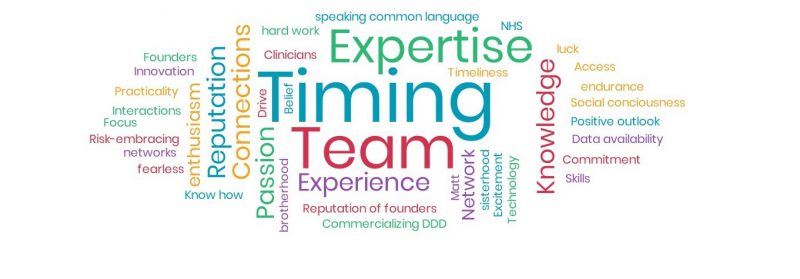
What’s makes a successful start up? The right time, the right team and the right expertise are the keys to a successful start-up in the minds of two of the leading geneticists behind Congenica. This is the message attendees heard at yesterday’s Bench to Boardroom EBML-EBI lecture.
Dr. Nick Lench, Chief Operating Officer and Dr. Andy Richards, Chairman of Congenica, who have developed the gold standard clinical genomics analysis platform Sapientia, addressed the audience of aspiring entrepreneurs in life sciences with their own story of transforming an idea into a commercially successful business.
The speakers started off with a brief outline of their backgrounds. Dr. Lench in molecular genetics and his journey through academia then into the private sector with Oxagen before taking over the newly established London Genetics based at University College London (UCL) from where he would go on to co-found Congenica.
“It’s Exciting, Inspirational & Somewhat Intoxicating”
“The seed had been planted while I was at UCL (University College London). We were trying to bring together these disparate strains of medicine whilst simultaneously all of these new and really exciting projects and ideas were happening. Its no secret that rare disease patients need fast diagnoses but here we were starting to see clearly how this would be achievable on a scale that truly could help patients.” Said Dr. Lench.
Dr, Richards, however, came from a different background. After earning his PhD he went to work for ICI doing research for drug discovery and utilising combinatorial chemistry. It was here he became fascinated by the new industry sector he could see emerging. “I had become really interested in the whole techno-commercial stuff. I founded my first couple of companies in the late 90’s. It was a real rollercoaster. So much so that I thought I might take a year as holiday to recover. What actually happened is that by the end of that year, I had founded four companies and was CEO of two of them. I think I’d become addicted.” Laughed Dr. Richards.
“What I love about start-ups is the ‘band of brothers’ mentality that such small companies have – us against the world. It’s exciting, inspirational and somewhat intoxicating.” Dr. Richards added.
For Dr. Lench though, it was a new experience. “I had been working with Dr. Phil Beales, another of our co-founders, who was doing sequencing at Great Ormond Street Hospital (GOSH). We both knew it was an amazing technology and we essentially wanted to sequence every child who came through the hospital’s doors, but the NHS simply didn’t have the resources. At GOSH we had only one bioinformatician and I think he was fresh out of university.”
“We had both contributed to the UK 10K and Deciphering Developmental Disorders (DDD) projects at the Sanger Institute and we could see the potential in combining this kind of data with bioinformatics. I met Tom Weaver and he told me that he’d got Richard Durbin and Matt Hurles on board and asked if I would like to get a company together. Well, this was exactly what I’d been waiting for, I was in.” Dr. Lench went on.
“Timing is everything though. The are lots of great ideas which get lost because they happened at the wrong time.” Explained Dr. Richards. “My measure of timing is to look at the team that naturally crystallises around an idea. That is the metric that shows me that other people are thinking the way I do, picking up on the same signals, whatever they might be. I looked around me at the people involved in this idea and we had incredible brains and the fact that they were clinicians reassured me that we were going to be doing good for the patients and I knew if we couldn’t do it, no one could.”
“Fundraising is Always Hard”
“So we had a fantastic idea, a great team, but we still needed investment.” Said Dr. Lench.
“Fundraising is always hard” said Dr. Richards. “This was something which we would need to integrate into healthcare. It’s hard because we had to convince people in an industry which inherently fears change because that change could kill people.”
“Another issue was the two types of investor who we were mainly approaching; tech and life sciences. The latter is obsessed with patents and the former is deeply uncomfortable with a lack of rapid traction and they often don’t see themselves getting those quick profits from industries like healthcare.” Dr. Richards added.
“Then we were selected by Genomics England for the UK 100 Thousand Genomes Project” Nick said.
You’d think a mandated organisation like that would have been the start of a great time for us but what happened was that investors suddenly sat on their hands. Mandates like this aren’t normal and biodata is a challenging environment at anytime. Still, its part of business and we kept our mindsets clear and we got the money.”
“Now we needed at team so we did the logical thing and started recruiting some of the best and brightest, including some from companies like the Sanger.” Added Andy, “We brought in people from our old teams and I knew it was imperative to bring in some people from the NHS and we were very lucky to get Dr. Andrea Haworth to be our Head of Clinical Services. We got our tech being used in healthcare and, though the learning curve has been steep, the rest is history.” Said Dr. Lench.
“Why are These Chinese Companies Investing?”
The speakers went on to take a number of questions from the audience, most of which focused on building relationships and a business with and in China.
“The reasons for going into China are simple,” Said Dr. Lench, “despite it being a hugely challenging market the potential rewards are massive.”
Dr. Richards explained: “People are asking, ‘why are these Chinese companies investing?’ It’s because China is a huge country but it’s also very new. The pace of change has been incredibly rapid, most of the buildings you see are less than 10 years old, people have moved en masse from the countryside to the cities and some of these cities, which were fishing villages 20 years ago, have populations of 15 million today. They have built their economy on growth and that growth has brought with it a middle class. This class have expectations of a healthcare system the kind of which has never existed there before but they have this growing middle class and an aging population. To convert to a system of western style, patient focused healthcare would simply require to vast a number of doctors and nurses to be trained so they must embrace next generation healthcare immediately.”
To sum up they left the audience with some inspiring encouragement to the budding business people.
“Do it.” Said Dr. Lench, “if you believe in it then just do it, have confidence and learn as you go. I think opportunities are easier now than they have ever been.”
“Appreciate places like this Cambridge Cluster too.” Added Dr. Richards, “clusters are great because they offer a low risk environment within which to take big risks. In a cluster, if something doesn’t work you can bounce from boat to boat. In my opinion it has less uncertainty than accademia or big business.”
“I’ve founded about 25 companies in my career. Could I have made more money? Yes, probably. Could I have done more good or had more fun? Probably not.”

.png?width=320&height=192&name=Untitled%20design%20(8).png)
.png?width=320&height=192&name=Since%202016%2c%20the%20number%20of%20women%20working%20in%20STEM%20fields%20in%20the%20UK%20has%20increased%20by%20216%2c552%2c%20taking%20the%20total%20number%20over%20the%201%20million%20mark%20for%20the%20first%20time.%20Women%20now%20make%20up%2024%25%20of%20the%20STEM%20workforce%20i%20(2).png)
-1.png?width=320&height=192&name=Deciphering%20Developmental%20Disorders%20(1)-1.png)